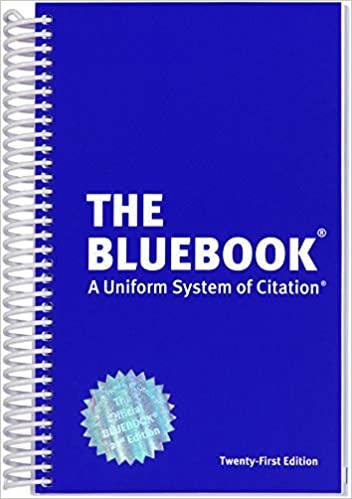Question
47. The concept of immunity from liability means that: one who harms another can be held liable only for voluntary acts. certain persons are not
47. The concept of immunity from liability means that:
- one who harms another can be held liable only for voluntary acts.
- certain persons are not subject to tort liability.
- one who harms another without intending to do so is not subject to tort liability.
- one who harms a child can never be sued by the parents of the injured child.
61. Chandra sues Martin for breach of contract. Both parties have completed discovery. Chandra now wants her attorney to file a motion to have the judge rule in her favor without having to proceed further. Chandra does not know whether the motion to dismiss or the motion for a summary judgment is proper. Which motion is proper and why?
62. Sally operates a large manufacturing firm near a federal land preserve known for its waterfowl and fauna. The federal government has just filed suit against Sally and her corporation, charging them with criminal violations of various environmental protection statutes. What rights do Sally and her corporation have that are guaranteed under the United States Constitution?
63. John and Jane are involved in an automobile accident in which both of them are injured.
At trial, the jury determined that John was 40% responsible and Jane was 60% responsible, and that both of them suffered damages valued at $100,000.00. Explain what John and Jane would be able to recover in (a) a contributory negligence state; (b) a pure comparative negligence state; and (c) a comparative negligence state with a 51% threshold.
64. In 1986, the head of the Department of Transportation reviewed a film that demonstrated the effectiveness of air bags in automobiles. He then passed a rule that Ford Motor Company must retrofit, without charge to the automobile owner, all of its 1985 models as an experiment on the safety of the air bag. Ford refused to do so. The DOT held a hearing and decided to fine Ford $1 million for violating its regulation. A notification of this decision was mailed to Ford. What constitutional issues does this case raise?
65. James Smith, a health inspector for the state of Missouri, inspected a restaurant owned by Salley Slick. Smith found numerous health violations in the restaurant and fined Slick accordingly. When Smith notified Slick of the infractions, Smith strongly suggested that $5,000 "would sure prove handy in the Spring" when he planned to purchase a new fishing boat. Slick understood Smith's obvious hint and offered Smith $5,000 if he would lose the paperwork concerning the failure of the restaurant to meet proper inspection guidelines. Smith accepted the $5,000 and lost the paperwork. One month later, Smith returned to the restaurant and told Slick that he would reappear every month and find violations unless Slick produced $1,000 each month to go toward the purchase of a fleet for Smith. Slick agreed to make the $1,000 payments. What crimes have been committed by Smith and Slick?
Step by Step Solution
There are 3 Steps involved in it
Step: 1

Get Instant Access to Expert-Tailored Solutions
See step-by-step solutions with expert insights and AI powered tools for academic success
Step: 2

Step: 3

Ace Your Homework with AI
Get the answers you need in no time with our AI-driven, step-by-step assistance
Get Started


